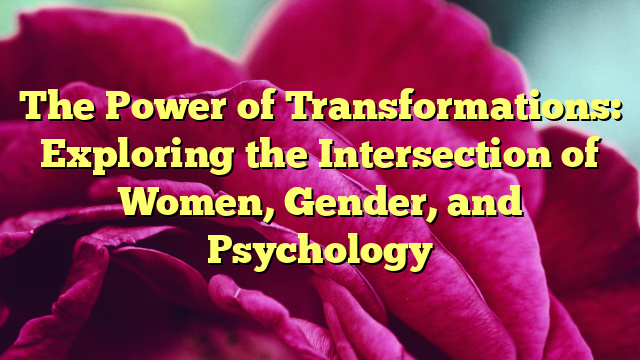The Power of Transformations: Exploring the Intersection of Women, Gender, and Psychology
The Power of Transformations: Exploring the Intersection of Women, Gender, and Psychology
Introduction
Women have long been at the forefront of social and cultural transformations, challenging traditional gender roles and advocating for equality. In recent years, the field of psychology has increasingly recognized the importance of understanding the unique experiences and perspectives of women and the impact of gender on mental health. This article explores the intersection of women, gender, and psychology, highlighting the power of transformations in these areas.
The Role of Women in Transforming Society
Throughout history, women have played a pivotal role in transforming society. From the suffragette movement to the feminist wave of the 1960s and 70s, women have fought for their rights and challenged societal norms. These transformations have not only led to legal and political changes but have also influenced the field of psychology.
Women’s movements have shed light on the unique challenges and experiences faced by women, leading to a greater understanding of gender disparities and the impact of societal expectations on mental health. This recognition has paved the way for the development of gender-sensitive approaches in psychology.
The Intersection of Gender and Psychology
Gender is a fundamental aspect of human identity and plays a significant role in shaping individual experiences and behaviors. The field of psychology has increasingly recognized the importance of considering gender in understanding mental health and well-being.
Research has shown that gender influences various aspects of psychological functioning, including cognitive abilities, emotional expression, and social interactions. For example, studies have found differences in the ways men and women process emotions and perceive social cues. Understanding these gender differences can help psychologists develop more effective interventions and treatment approaches.
Gender and Mental Health
The intersection of gender and mental health is a complex and multifaceted area of study. Women are more likely than men to experience certain mental health disorders, such as depression and anxiety. This disparity can be attributed to a range of factors, including biological, social, and cultural influences.
Biological factors, such as hormonal fluctuations, can contribute to gender differences in mental health. Additionally, societal expectations and gender roles can place women at a higher risk for certain mental health issues. For example, the pressure to conform to societal beauty standards can contribute to body image dissatisfaction and eating disorders.
Understanding the intersection of gender and mental health is crucial for developing effective prevention and treatment strategies. By recognizing the unique challenges faced by women and the impact of gender on mental well-being, psychologists can provide more tailored and comprehensive care.
Transformations in Psychological Research
The recognition of the intersection of women, gender, and psychology has led to significant transformations in psychological research. Researchers are increasingly focusing on studying the unique experiences and challenges faced by women, as well as the impact of gender on psychological processes.
For example, studies have explored the role of gender in career development and work-life balance. Research has shown that women often face unique barriers and challenges in the workplace, such as gender bias and the motherhood penalty. Understanding these factors can help inform policies and interventions aimed at promoting gender equality in the workplace.
Psychological research has also shed light on the impact of gender on interpersonal relationships and social interactions. Studies have found that gender influences communication styles, conflict resolution strategies, and relationship satisfaction. This knowledge can be used to develop more effective couples therapy and relationship counseling approaches.
Gender-Sensitive Approaches in Psychology
The recognition of the intersection of women, gender, and psychology has also led to the development of gender-sensitive approaches in the field. Psychologists are increasingly incorporating gender as a critical factor in assessment, diagnosis, and treatment.
Gender-sensitive approaches recognize the unique experiences and challenges faced by women and aim to provide more tailored and effective care. For example, therapists may consider the impact of societal expectations and gender roles on a woman’s mental health and well-being. They may also address issues such as body image, self-esteem, and empowerment in therapy sessions.
Additionally, gender-sensitive approaches also consider the experiences of individuals who do not conform to traditional gender norms. This inclusivity ensures that all individuals, regardless of their gender identity, receive appropriate and affirming care.
Conclusion
The intersection of women, gender, and psychology is a powerful area of study that has led to significant transformations in both research and practice. By recognizing the unique experiences and challenges faced by women and the impact of gender on mental health, psychologists can provide more effective and tailored care. The power of transformations in these areas is evident in the progress made towards gender equality and the development of gender-sensitive approaches in psychology.

